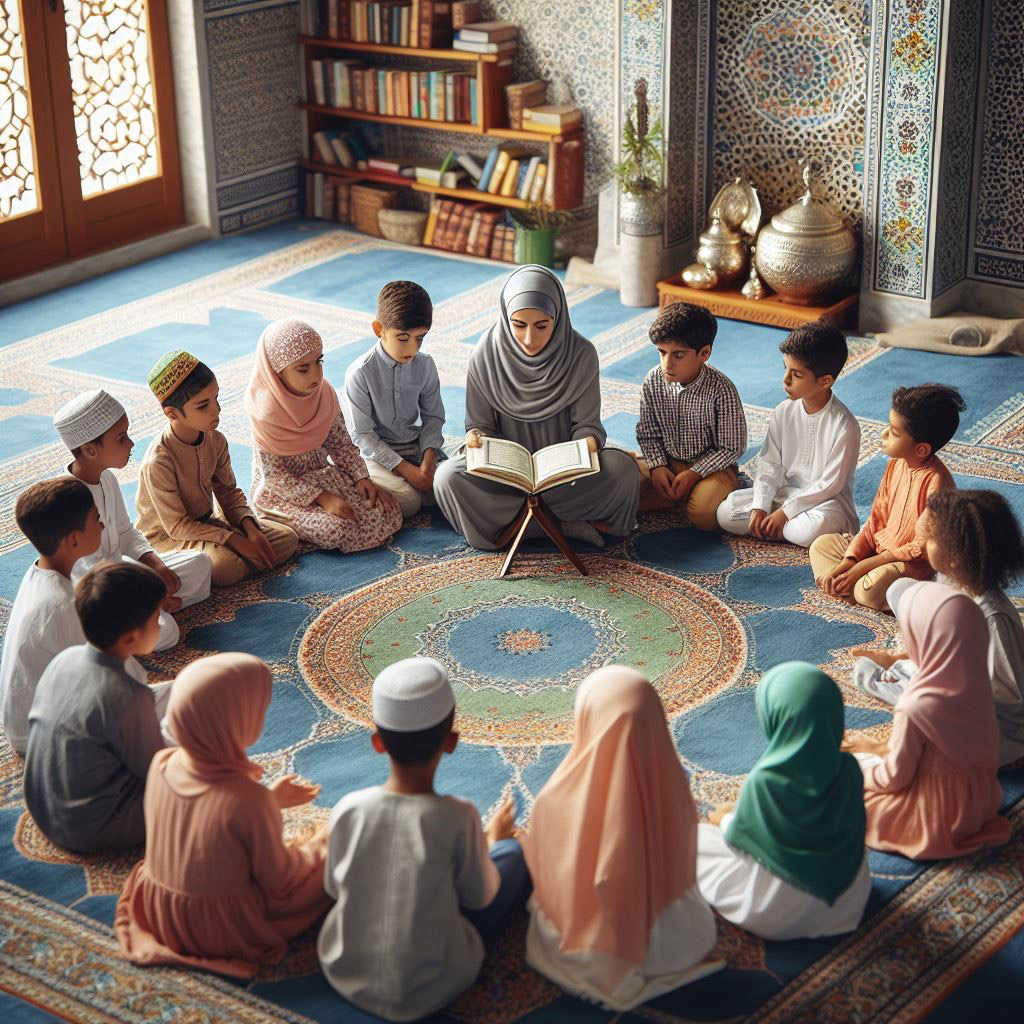O seeker of knowledge, there are three signs for a scholar: knowledge, patience and silence.
Ali ibn Abi Talib (a)
Importance of teaching Quran at a young age
Teaching the Noble Quran at a young age is a topic of great significance in the Islamic community.
The Sacred Quran, considered the holy book of Islam, holds immense religious and cultural importance for Muslims worldwide.
This essay aims to explore the historical context, key figures, and the impact of teaching Quran at a young age.
It will identify and analyze influential individuals who have contributed to this field, discuss various perspectives, and provide a well-reasoned analysis of both the positive and negative aspects.
Additionally, potential future developments related to teaching the Grand Quran at a young age will be considered.
The roots of teaching the Sacred Quran at a young age can be traced back to the early years of Islam.
The Prophet Muhammad (S), the central figure in Islamic history, emphasized the importance of imparting religious education to children from a young age.
The Prophet himself received revelations of the Glorious Quran directly from Allah, and he, in turn, shared these teachings with his companions and the wider community.
Key figures who contributed to the importance of teaching the Noble Quran at a young age include Abu Bakr, the first Caliph, and Umar ibn al-Khattab, the second Caliph.
They recognized the pivotal role of religious education, particularly for younger generations, and established systems to ensure its dissemination.
Their efforts laid the foundation for Islamic education, including the teaching of the Holy Quran.
The impact of teaching the Sacred Quran at a young age is significant and multifaceted.
It helps instill the fundamental principles of Islam, develops a deep understanding of religious values, and fosters a personal relationship with Allah.
One influential individual who has contributed to this field is Imam Ghazali, a prominent Islamic scholar of the 11th century.
He stressed the importance of starting Quranic education during childhood, arguing that it enhances cognitive development and moral character.
Ghazali believed that educating children about Quran at a young age would shape them into responsible individuals, guided by Islamic principles throughout their lives.
Another influential figure is Sheikh Mohammed bin Rashid Al Maktoum, the Vice President and Prime Minister of the United Arab Emirates.
Under his leadership, the UAE has implemented widespread initiatives to prioritize Quranic education for children.
The Dubai International Holy Quran Award, initiated by Sheikh Mohammed, aims to encourage young learners to memorize and understand the Grand Quran.
This initiative has positively impacted the lives of countless children, fostering a deeper connection with their faith.
Teaching the Sacred Quran at a young age has garnered both praise and criticism from various perspectives. Advocates argue that early exposure to the Holy Quran promotes spiritual growth and helps in building a strong Muslim identity. They contend that understanding Quran’s teachings from a young age allows children to develop a moral compass, leading to righteous behavior and positive contributions to society. Additionally, children who learn the Pure Quran early are more likely to become proficient in recitation and memorization.

Conversely, some skeptics argue that early religious education can be overwhelming for children, potentially leading to a rote understanding without genuine comprehension. Critics suggest that focusing solely on Quranic education may neglect other important areas of education, such as science, mathematics, and critical thinking skills necessary for a well-rounded academic foundation.
Furthermore, there are concerns that excessive emphasis on religious education at a young age may lead to intolerance and discourage dialogue with people of different beliefs.
In terms of future developments, advancements in technology and digital platforms have made Quranic education more accessible.
Online resources, mobile applications, and e-learning platforms are now widely available, providing interactive and engaging ways of learning the Quran for young individuals.
This trend is likely to continue, supporting broader access to religious education.
Teaching Quran at a young age holds immense importance within the Islamic community.
Rooted in the historical context of Islam, key figures such as the Prophet Muhammad, Abu Bakr, and Umar ibn al-Khattab have emphasized the significance of religious education for children.
Influential individuals like Imam Ghazali and Sheikh Mohammed bin Rashid Al Maktoum have made significant contributions to the field, highlighting the benefits of early Quranic education.
While there are varying perspectives on the subject, it is crucial to strike a balance between religious education and a comprehensive academic curriculum.
By fostering a holistic approach that values critical thinking and respect for diversity, the future developments in teaching the Grand Quran at a young age can ensure a generation that is knowledgeable, empathetic, and grounded in their faith.
Age-Appropriate Learning
Before embarking on the journey of teaching the Holy Quran it is crucial to recognize the importance of age-appropriate learning. Children’s cognitive abilities and attention spans undergo significant changes as they grow greatly influencing their receptiveness to instruction and comprehension levels.
Introducing religious teachings too early may overwhelm young minds leading to a lack of understanding or disinterest. Conversely delaying Quranic education beyond a certain point may result in missed opportunities for spiritual development.
Early Childhood (0-6 years)
During early childhood children are like sponges absorbing information from their surroundings. However, their cognitive capacities are still developing and their learning primarily occurs through play and imitation.
At this stage parents can focus on nurturing a love for God through simple prayers reciting short verses and storytelling that highlights moral lessons from the Glorious Quran.
While direct Quranic instruction may be limited the emphasis should be on creating a positive association with Islam and instilling core values.
Middle Childhood (6-12 years)
As children enter middle childhood they become more curious and inquisitive seeking deeper explanations for the world around them.
This period marks a suitable time to introduce formal Quranic education. Children at this age can begin memorising short chapters or verses learning basic Arabic vocabulary and understanding the fundamental concepts of Islam.
Engaging with a knowledgeable teacher or participating in structured Quranic classes can provide a comprehensive and systematic approach to learning.
Adolescence (12-18 years)
Adolescence is a critical phase in a child’s psychological and emotional development.
At this stage they possess the necessary cognitive abilities to comprehend complex ideas and engage in critical thinking.
Therefore, it is an opportune time to deepen their Quranic understanding explore the teachings of the Prophet Muhammad (S) and encourage independent reflection on moral and ethical issues.
Adolescents can delve into more advanced Quranic studies including interpretation and contextual analysis enabling them to develop a more profound connection with their faith.
Parental Guidance
While determining the appropriate age for teaching the Holy Quran is essential parental guidance remains paramount throughout the entire process.
Parents are integral in fostering a nurturing environment that facilitates their child’s religious education. They serve as role models exemplifying the principles and values of Islam through their daily actions. By incorporating Quranic teachings into family rituals such as reciting verses together or discussing moral lessons during mealtime parents can reinforce their child’s understanding and religious identity.

Utilizing Technology and Resources for Effective Teaching
One of the significant advantages of using technology in teaching the Grand Quran is the ability to access various online platforms and applications that provide a wealth of resources and materials. These platforms offer digital versions of the Glorious Quran with translations and transliterations, making it easier for students to understand and learn the meanings of the verses.
Additionally, there are numerous recitation apps available that allow students to listen to different reciters, helping them improve their pronunciation and recitation skills.
Another beneficial aspect of technology in Quran teaching is the availability of online forums and discussion groups.
These platforms like DarulQuran provide an opportunity for students to connect with other learners and scholars from around the world, allowing them to engage in discussions, ask questions, and seek guidance.
This not only enriches their understanding of the Noble Quran but also helps foster a sense of community and belonging among learners.
Furthermore, utilizing technology enables teachers to incorporate multimedia elements into their lessons. They can use videos, animations, and interactive presentations that illustrate Quranic stories and concepts. This visual aid helps students to better comprehend and retain what they are learning, as it appeals to various learning styles.
Additionally, teachers can use multimedia to bring historical contexts to life, making the learning experience more immersive and captivating.
Moreover, technology facilitates distance learning, which is particularly useful for students who may be unable to attend traditional Quran classes due to various reasons, such as living in remote areas or having busy schedules. Online Quran academies like DarulQuran offer flexibility and convenience, allowing students to learn at their own pace and schedule sessions that suit their availability.
This accessibility ensures that anyone with an internet connection can have access to quality Quranic education.
The impact of parental guidance on determining the age to start teaching the Sacred Quran cannot be underestimated.
Parents are the primary educators of their children and hold the responsibility of imparting religious teachings. Their guidance can significantly influence a child’s spiritual development.
Positive Aspects:
- Moral and Spiritual Formation: Early exposure to the Quran can instill moral values, ethics, and spiritual development in children, providing them with a strong foundation for their future religious practices.
- Language Acquisition: Teaching the Quran to children from a young age enhances their language skills, as Quranic Arabic is considered a pure and eloquent form of the Arabic language.
- Nurturing a Love for the Noble Quran: When parents prioritize Quranic education and exhibit enthusiasm themselves, children are more likely to develop a deep love and reverence for the Quran.
Negative Aspects:
- Pressure and Overwhelming Burden: Parents who start Quranic education too early may inadvertently put excessive pressure on their children, leading to burnout or disinterest. This could result in a negative association with the Pure Quran.
- Limited Understanding: Young children may struggle to grasp the complex concepts and teachings of the Holy Quran, leading to a superficial understanding rather than meaningful comprehension.
- Potential Neglect of Other Essential Knowledge: Overemphasizing Quranic education at an early age might lead to a neglect of other essential subjects, such as mathematics, science, or social sciences.
The appropriate age to start teaching the Sacred Quran to children varies across cultures, schools of thought, and individual perspectives. Each perspective offers unique insights into the decision-making process for parents.

- Cultural Differences: Different cultures have different traditions and beliefs regarding religious education. Some cultures prioritize early Quranic education, while others opt for a later start after a child has developed comprehension skills.
- Individual Readiness: Assessing a child’s individual readiness must take into account their cognitive, emotional, and physical development. Every child matures at a different pace, and parents should consider their child’s capabilities before introducing Quranic education.
- Evolving Pedagogical Approaches: Modern advancements have led to the development of various teaching methodologies, allowing parents and educators to customize Quranic education based on a child’s capabilities. These developments can enhance the overall experience and effectiveness of teaching the Noble Quran.
In conclusion, parental guidance plays a critical role in determining the appropriate age to start teaching the Grand Quran to children. The historical context, key figures, positive and negative aspects, as well as diverse perspectives, all contribute to this decision-making process. Parents should consider the moral, linguistic, and emotional aspects while assessing their child’s readiness. Future developments in pedagogy and individualized education hold the potential for more effective teaching practices. Ultimately, a balanced and well-reasoned approach is essential for creating a meaningful Quranic educational experience for children.


